MYTHENDER HEARTS
WARRIOR
who values the power of skill and might
You are a master of arms. With unmatched prowess on the battlefield, you slice through Mythic armies as though they were parchment. Your versatility is your strength—any blade, bow, or cudgel is a manifestation of death in your hands.
As a Mythender, you understand that your true power to End gods comes from your unmatched skill and willingness to use it.
Questions
What skill do you value most?
Who forged you into the warrior you are?
What honor do you still fight for?
Weapon Ideas
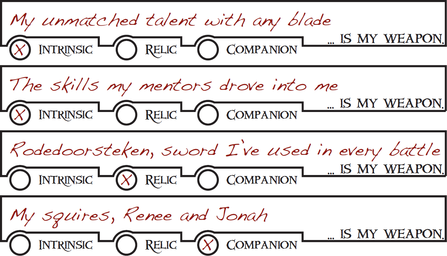
First Gift: Relentlessness

Mythenders do not fail to hit their mark. But not every blow comes down with the same power. You can call upon your Heart to make the force of your blow harder, reminding Myths that you will not suffer them.
CRUSADER
who values the power of belief and conviction
You are an unshakable idealist. You have seen the power of the belief—for Church, kingdom, romance, or ideal—and have discovered how to use that against the Mythic World. Your passion is as sharp as any sword and strikes as true as any arrow.
As a Mythender, you understand that your true power to End gods comes from the strength of your unwavering conviction.
Questions
What belief or ideal do you fight for?
What happened to make you see the world as unjust?
What is the inevitable result of your righteous deeds?
Weapon Ideas
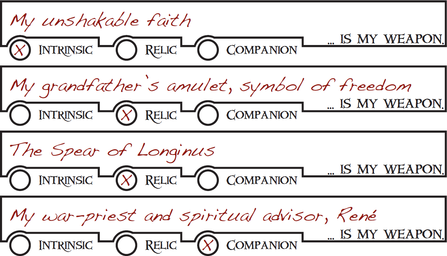
First Gift: Bloodlust

When you are Wounded, your Heart rages. It replaces the blood flowing out of you with more of the Mythic World’s own strength, giving you the strength and will to strike back hard at your foe.
COMMANDER
who values the power of men and trust
You are the mind and will of an army. Whether your companions number a dozen or a thousand, they are fierce—a walking reckoning. Be they mortal, animal, or even captured Myths, they are extensions of your campaign against the Mythic World.
As a Mythender, you understand that your true power to End gods comes from your willingness to take on the burden of leadership.
Questions
Who follows you into battle?
How did you gain your companions?
Do you still try to act human around them? Why/why not?
Weapon Ideas
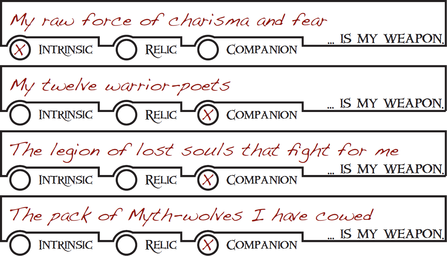
First Gift: Dual Wield

Two blows are better than one. You can draw from your Mythic Heart to strike with preternatural speed, granting you twice the power from your assault.
BEARER
who values the power of relics and destiny
You are a locus of destiny. It was no accident that you encountered your Relic; you were born to End Myths. Your family, mentor, Fate, or the relic itself knew this. But you aren’t simply the plaything of some force. You use this strength to bring about the fate of the Mythic World.
As a Mythender, you understand that your true power to End gods comes from your dominion over your destiny.
Questions
How did you gain your relic?
What does your relic whisper to you?
Do you trust your relic?
Weapon Ideas
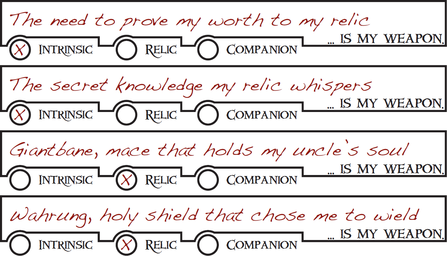
First Gift: Grievous Harm

The blows you strike are more vicious than that of your comrades. By pushing your Mythic Heart, you sunder flesh as though it were snow, and the screams of your foes echo throughout the Mythic World’s mountains or skies.
TEMPEST
who values the power of magic and sacrifice
You are the eye of a living storm. Taking more of the Fate’s Faustian bargain than your comrades, you have stolen some of the Mythic World’s magic to use against it. Such magic has a cost, but the poetic justice of using that power is too rich to resist.
As a Mythender, you understand that your true power to End gods comes from the willingness to sacrifice anything.
Questions
What unnaturalness do you wield?
What did you have to do to get your power?
What is the toll that must be paid?
Weapon Ideas
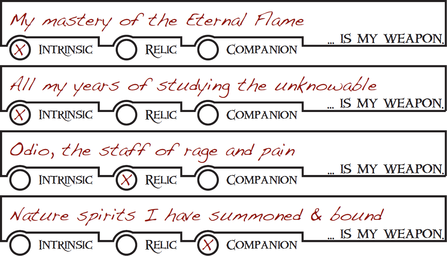
First Gift: Harbinger of Storms

Every moment of battle is filled with rage and hate. Your Mythic Heart pumps stronger than most, pushing you to gain more power from every charge, from every attack.
LOREMASTER
who values the power of intellect and patience
You are intellect and experience made manifest. There is no such thing as chance to you; when you walk onto the field of battle, you already know how it will end. And you will violently demonstrate that fact to all Myths. You are a philosopher, scholar, tactician, warrior-poet.
As a Mythender, you understand that your true power to End gods comes from confidence and sharpness of mind.
Questions
How do you use your mind on the field of battle?
How did you first use this against your foes?
What about the world do you wish to preserve?
Weapon Ideas
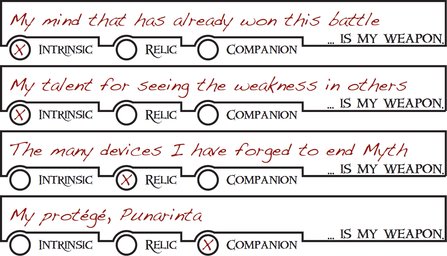
First Gift: Fast Strike

The power you wield comes from the violence you inflict. Most Mythic Hearts must take the violence in, releasing its power later. You needn’t wait—you have learned how to channel your Heart more efficiently.
MAKING NEW HEARTS
The point of the Heart is to give a focus on exactly how badass a Mythender with that Heart is. Because Mythender is so open-ended, this early decision is part of what keeps one Mythender feeling like another. So when you’re looking to make a new Heart, the first question to ask yourself is: what does this Heart do that others don’t? Just as important, what power is it that this Heart values?
Hearts ultimately answer the question of how a Mythender is going to stab gods in their fucking faces.
The difference can be small—such as creating a variant of the Commander called the Teacher, who values the power of wisdom and eagerness. It could be something that introduces new information into the setting—such as the Lycanthrope, who values the power of nature and duality. However, avoid those that sound more like backgrounds that describe where the Mythender came from—such as the Time Traveler. Those are Pasts. The Heart describes the person in the here and now.
The Heart’s three questions focus further, lending color and information to the story before you even answer them. The first one or two are usually obvious, but still need to be answered, as those are relatively easy answers to get a character concept started. For instance, answering the Commander’s “Who follows you into battle?” question makes you state how your character fulfills the base concept of being a Commander.
The third question spins the story in a different direction, though, either as hard or leading questions. The Tempest’s “What is the toll that must be paid?” tells you that there is a cost to the magic he wields. The Crusader’s “What is the inevitable result of your righteous deeds?” tells you that you do see an end, whether noble or ignoble, and aren’t thus filled with purpose. When the third question does this, it results in a deeper character.
Coming up with Weapon ideas will tell you if your Heart seems interesting from this game’s perspective. If you can come up with at least two right away, it has promise. If not, it probably isn’t the Heart for you. That said, don’t stress too much about this; in playing with the Heart, you’ll fill in the rest.
When choosing the first Gift for a Heart, pick whichever one seems thematically appropriate. It can be the same one that an existing Heart has; there’s no mandate that they all be different. Stick to ones that cost 2 Might tokens or fewer to use. You may even be tempted to create a new Gift for that Heart, though if you do, ask yourself this: why can’t other Mythenders have that Gift as well?
Finally, you could scrap all of the existing Hearts, and build new ones from scratch to fit a given theme. One fun theme could be to make Hearts based on the classic fantasy adventuring roles: the Fighter, the Cleric, the Rogue (or the Thief, if you’re old-school), the Wizard (or the Magic-User, if you’re way-old-school), the Paladin, the Bard, etc.